
According to new research, the COVID-19 pandemic has caused a protracted shock to life expectancy levels, leading to global mortality changes unprecedented in the last 70 years.
- Most of Western Europe experienced life expectancy bouncebacks in 2021
- Scale of Eastern Europe losses akin to the mortality crisis at the break-up of the Soviet Union
- Countries with higher proportions of fully vaccinated people generally experienced smaller life expectancy deficits
COVID-19 has caused a protracted shock to life expectancy levels, leading to global mortality changes unprecedented in the last 70 years, according to research that will be published today (October 17) in the journal Nature Human Behaviour from Oxford’s Leverhulme Centre for Demographic Science and the Max Planck Institute for Demographic Research.
Using data from 29 countries in Europe, as well as Chile and the US, the researchers found life expectancy in 2021 remained lower than expected across all 29 countries, had pre-pandemic trends continued.
Previous global epidemics have seen fairly rapid “bounce backs” to life expectancy levels. But the scale and magnitude of COVID-19, on mortality, confounds claims it has had no more impact than a flu-like illness. Life expectancy losses during recurring flu epidemics over the second half of the 20th century have been much smaller and less widespread than those seen in the pandemic.
A clear geographical divide appeared in 2021. The researchers found most countries in Western Europe experienced life expectancy bounce-backs from the sharp losses in 2020. Sweden, Switzerland, Belgium, and France saw complete bouncebacks, returning to pre-pandemic 2019 life expectancy levels. While England and Wales saw partial bounce-backs from 2020 levels in 2021. Life expectancy in Scotland and Northern Ireland, however, remained at the same depressed level as 2020.
But Eastern Europe and the US witnessed worsening or compounded losses in life expectancy over the same period. The scale of life expectancy losses during the COVID-19 pandemic in Eastern Europe were akin to those last seen at the break-up of the Soviet Union, according to the research.
This East-West divide in life expectancy during COVID-19 generally reflects bigger losses in countries that had lower pre-pandemic life expectancy levels. Bulgaria was the worst-hit of the countries studied, with a decline in life expectancy of nearly 43 months, over two years of the pandemic. According to the paper, “Bulgaria, Chile, Croatia, Czech Republic, Estonia, Germany, Greece, Hungary, Lithuania, Poland, and Slovakia suffered substantially higher life expectancy deficits in 2021 compared to 2020, indicating a worsening mortality burden over the course of the pandemic.”
In addition to pre-pandemic life expectancy, there appeared to be a vaccination effect that followed the same East-West divide in Europe. Countries with higher proportions of fully vaccinated people experienced smaller life expectancy deficits. Older ages, especially those over 80 who had seen the bulk of deaths in 2020, benefitted from vaccine protection and a decline in excess mortality in 2021.
Dr. Ridhi Kashyap, a study co-author from Oxford, points out, “A notable shift between 2020 and 2021 was that the age patterns of excess mortality shifted in 2021 towards younger age groups, as vaccines began to protect the old.”
But there were “outliers,” which had surprisingly high life expectancy losses, in spite of high vaccination rates. Dr. Jonas Schöley, study co-author from the Max Planck Institute, says, “Finer-grained details of the age prioritization of vaccine roll-out and the types of vaccines used may account for some of these differences, as well as correlations between vaccine uptake and compliance with non-pharmaceutical interventions or the overall health care system capacity.”
He adds, “Countries, such as Sweden, Switzerland, Belgium, and France, managed a recovery to pre-pandemic levels of life expectancy because they managed to protect both the old and the young.”
The research team voices concern, however, about the possible wider international impact of the pandemic. Another study co-author, Dr. José Manuel Aburto, maintains, “In 2020, losses in life expectancy suffered in Brazil and Mexico exceeded those experienced in the US, so it is likely these countries may have continued suffering mortality impacts in 2021 – even potentially exceeding the 43 months we estimated for Bulgaria.”
The paper concludes, “It is plausible that countries with ineffective public health responses will see a protracted health crisis induced by the pandemic with medium-term stalls in life expectancy improvements, while other regions manage a smoother recovery to return to pre-pandemic trends.”
Reference: “Life expectancy changes since COVID-19” 17 October 2022, Nature Human Behaviour.
DOI: 10.1038/s41562-022-01450-3


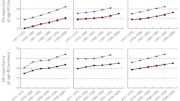
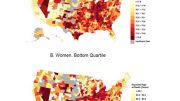

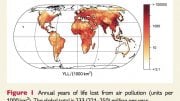
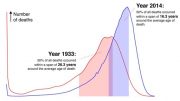

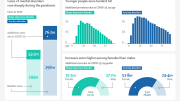
Also, ‘unprecedented’ use of the term “Life Expectancy” for data from a couple of years! See? Covid-19 is not without befefit: it spurs Homo sapiens”creativity’ 😀 😀 😀 …
Totally artificial. This is one of the worst named statistics out there. How on Earth would some elderly people dying prematurely now, because of this sudden introduction of this virus, affect the longevity of someone born today?
And when the pandemic is over, life expectancy will bounce back the other direction. As some of the people that would have been dying then, already died earlier. It probably won’t be extreme, maybe half a year, but lasting for 5 years or so.
I am not saying the metric is useless, it isn’t. It is great for seeing how well a country is doing protecting its citizens’ health, but it is not what its name implies. Though, for it to be as useful as it was in the past, the pandemic effects to the statistic must be considered.
I guess I am irritated and looking for somewhere to vent because USA Today basically said that Latinos have shorter life expectancies and that before the pandemic the gap was shrinking. Someone did absolutely no research. Latinos live much longer than White/European Americans, while using far less healthcare, working very long hours in dangerous/unhealthy jobs. So, no, the pandemic, if it affected them worse, rather than just earlier, would have actually led to a reduction of the gap as they started out ahead.
Most shocking declines in life expectancy I’ve seen have been from the vaccinated dropping dead!
What are you talking about? USA life expectancy is declining, not Bulgaria. Here are the statistics for Bulgaria:
The current life expectancy for Bulgaria in 2022 is 75.36 years, a 0.17% increase from 2021. The life expectancy for Bulgaria in 2021 was 75.23 years, a 0.17% increase from 2020. The life expectancy for Bulgaria in 2020 was 75.11 years, a 0.17% increase from 2019.